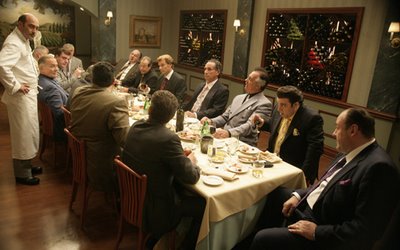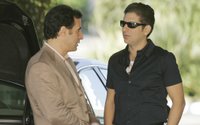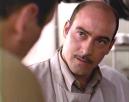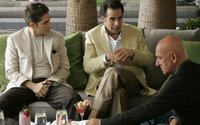Sopranos Mondays: Season 6, Ep. 7: "Luxury Lounge"
By Matt Zoller Seitz
 If the first six episodes of this season felt like a voyage into unexplored territory, Sunday night's "Sopranos" episode felt like a return to familiar stomping grounds -- specifically those stretches of Season Two and Three when you felt pretty sure that David Chase and his writers were trying to run out the clock a bit while they figured out how to stage the mandatory season-ending string of whammies.
If the first six episodes of this season felt like a voyage into unexplored territory, Sunday night's "Sopranos" episode felt like a return to familiar stomping grounds -- specifically those stretches of Season Two and Three when you felt pretty sure that David Chase and his writers were trying to run out the clock a bit while they figured out how to stage the mandatory season-ending string of whammies.
Written by Matthew Weiner and directed by Danny Leiner, this episode, titled "Luxury Lounge," wasn't unwatchable. It had unifying emotional threads, specifically envy and its twin, resentment. Diverse groupings of social strivers directed those feelings toward higher-ups on the food chain (aspiring Hollywood player Chris Moltisanti flying to L.A. to bag Ben Kingsley and becoming obsessed with the swag handed out to the sorts of people he dreams of emulating; failing restaurant owner Artie Bucco resenting Tony Soprano and the freelancing mob goons who were robbing him in a credit card scam) while the powerful expressed indifference or condescension toward those beneath (Kingsley's wary rebuffs to Hollywood parasites; Tony realizing the depth of Artie's despair too late to halt its consequences). All in all, though, the hour still felt slack and formulaic. (Admittedly that may seem an odd complaint, considering that last week's episode, "Live Free or Die," struck many viewers as meandering and uneventful -- but I thought it was the year's second most suspenseful episode, after "Join the Club.")
 Yes, the episode moved season-long arcs a few steps forward. Tony subcontracted Johnny Sack's hit-by-proxy to a couple of triggermen from the Old Country. Chris tried and failed to sign Ben Kingsley to star in his digital horror flick, fell off the wagon, spiraled into swag-envy and mugged guest star Lauren Bacall for her goodie bag. While Chris made an ass of himself on the left coast, his Jersey crew ran wild, ruining Artie's business, violently exacerbating tensions between Artie and Benny Fazio and ultimately leading Tony to rebuke Chris for his lack of focus. There were further hints that the Arabs, one of many clients in the credit-card scam, will prove important later, perhaps as a tool to entrap Chris into becoming an informer. (Years ago, I predicted that Chris' story would end with him becoming a postmodern cousin of Henry Hill in "Goodfellas," perhaps retroactively establishing him as the series' invisible storyteller -- but for now, I can only wonder.)
Yes, the episode moved season-long arcs a few steps forward. Tony subcontracted Johnny Sack's hit-by-proxy to a couple of triggermen from the Old Country. Chris tried and failed to sign Ben Kingsley to star in his digital horror flick, fell off the wagon, spiraled into swag-envy and mugged guest star Lauren Bacall for her goodie bag. While Chris made an ass of himself on the left coast, his Jersey crew ran wild, ruining Artie's business, violently exacerbating tensions between Artie and Benny Fazio and ultimately leading Tony to rebuke Chris for his lack of focus. There were further hints that the Arabs, one of many clients in the credit-card scam, will prove important later, perhaps as a tool to entrap Chris into becoming an informer. (Years ago, I predicted that Chris' story would end with him becoming a postmodern cousin of Henry Hill in "Goodfellas," perhaps retroactively establishing him as the series' invisible storyteller -- but for now, I can only wonder.)
Still, these plot points weren't so much integrated into the episode as jabbed in like tent stakes, and the script seemed to have been written by somebody wearing work gloves. This was definitely an episode where you could say it wasn't the characters who were cloddishly transparent, but the show itself. Chris has always been a dunderhead who can't keep his trap shut, but his flattery of Bacall ("You were great in 'The Haves and Have-Nots'") was a badness twofer, a fumble-fingered summing-up of the episode's themes and a gag so lame it almost made you feel sorry for a character who deserves no sympathy (which, I concede, may have been the point). I also winced at red-hot immigrant hostess Martina rebuffing Artie with, "You stare at me like food." Her follow-up image, of laughing at Artie while screwing Benny atop a pile of stolen money, was more potent, if equally obvious.
where you could say it wasn't the characters who were cloddishly transparent, but the show itself. Chris has always been a dunderhead who can't keep his trap shut, but his flattery of Bacall ("You were great in 'The Haves and Have-Nots'") was a badness twofer, a fumble-fingered summing-up of the episode's themes and a gag so lame it almost made you feel sorry for a character who deserves no sympathy (which, I concede, may have been the point). I also winced at red-hot immigrant hostess Martina rebuffing Artie with, "You stare at me like food." Her follow-up image, of laughing at Artie while screwing Benny atop a pile of stolen money, was more potent, if equally obvious.
Poor Artie got stuck with the lion's (or mouse's) share of clunkers -- a real shame considering the caliber of John Ventimiglia's performance. He was exquisitely desperate, Willy Loman by way of "Big Night" (a film indelicately referenced in the pre-credits, back-to-square-one cooking montage -- scored, naturally, to 'old country' music). He and coastar James Gandolfini saved that pro forma Bada Bing scene between Artie and Tony, where Artie indicated a gyrating stripper and told Tony, "You could fuck her" and then went on to establish that Artie couldn't, because he's the responsible one. But on this show, the actors shouldn't be asked to perform salvage work. This isn't "Six Feet Under," where subtext equals text -- or at least, it doesn't have to be that way. The same point could have been made with silent expressions, or with a more oblique bit of dialogue. There were too many lines like that--particularly, "We lead the world in computerized data collection!", which sounds like Todd Solondz after a lobotomy.
 My Star-Ledger colleague Alan Sepinwall was fonder of this episode than I was, and found Artie's scenes especially effective. "'Luxury Lounge' had the same starting point as 'Everybody Hurts,' one of the low points of the already-low Season Four," he wrote. "Artie gets a crush on the sexy new Vesuvio hostess, she winds up costing him a lot of money and he tries to play tough guy to get revenge. But where 'Everybody Hurts' wallowed in what an ineffectual joke Artie was, 'Luxury Lounge' worked because it took Tony's oldest friend seriously. For the first time since the season one finale (which got referenced both with Artie's hunting rifle and Tony's story about Vesuvio being his port in that storm), Artie wasn't just the clown good for nothing but making antipasto. He was the honest man in the dirty town, the guy who struggles trying to do things the right way while his pal Tony is rolling in crooked cash. Artie's no saint, as evidenced by his yearning for Martina and then the way he dogged her when he realized she was with Benny. But in that scene in bed with Charmaine and the one at the Bing with Tony, you saw a man who had gone past midlife crisis (remember the earring?) and into existential despair."
My Star-Ledger colleague Alan Sepinwall was fonder of this episode than I was, and found Artie's scenes especially effective. "'Luxury Lounge' had the same starting point as 'Everybody Hurts,' one of the low points of the already-low Season Four," he wrote. "Artie gets a crush on the sexy new Vesuvio hostess, she winds up costing him a lot of money and he tries to play tough guy to get revenge. But where 'Everybody Hurts' wallowed in what an ineffectual joke Artie was, 'Luxury Lounge' worked because it took Tony's oldest friend seriously. For the first time since the season one finale (which got referenced both with Artie's hunting rifle and Tony's story about Vesuvio being his port in that storm), Artie wasn't just the clown good for nothing but making antipasto. He was the honest man in the dirty town, the guy who struggles trying to do things the right way while his pal Tony is rolling in crooked cash. Artie's no saint, as evidenced by his yearning for Martina and then the way he dogged her when he realized she was with Benny. But in that scene in bed with Charmaine and the one at the Bing with Tony, you saw a man who had gone past midlife crisis (remember the earring?) and into existential despair."
I'll give Ventimiglia his due. He's a versatile, often sly actor -- rent "Trees Lounge" or "On the Run" if you don't believe it -- and he managed to sell (or at least rescue) every scene he did. He has a soulfulness that this show rarely taps because of its vested interest in portraying Artie as Tony's schmucked-up, law-abiding doppleganger (a role ceded to Ventimiglia's pal and frequent collaborator, "Trees Lounge" director Steve Buscemi, throughout the first half of Season Five). In some images, your heart just couldn't help but go out to him: depressed and smoking at the Bada Bing; backing away in mute shock after Tony told him to shut up and cook; addressing a freshly-shot rabbit carcass with a faux-street-tough "Motherfucker!" He was credibly frightening when thrashing Benny, then joyous-yet-pathetic executing a karate move afterward. (Am I remembering wrong, or did the episode "Test Dream" confirm that in high school, Artie was the dangerous one, and Tony the tag-along hero-worshiper?) Still, improving on "Everybody Hurts" doesn't strike me as the best use of the show's time or Ventimiglia's, especially considering that the six-hour run-up was more ambitious and focused, and much less obvious.
director Steve Buscemi, throughout the first half of Season Five). In some images, your heart just couldn't help but go out to him: depressed and smoking at the Bada Bing; backing away in mute shock after Tony told him to shut up and cook; addressing a freshly-shot rabbit carcass with a faux-street-tough "Motherfucker!" He was credibly frightening when thrashing Benny, then joyous-yet-pathetic executing a karate move afterward. (Am I remembering wrong, or did the episode "Test Dream" confirm that in high school, Artie was the dangerous one, and Tony the tag-along hero-worshiper?) Still, improving on "Everybody Hurts" doesn't strike me as the best use of the show's time or Ventimiglia's, especially considering that the six-hour run-up was more ambitious and focused, and much less obvious.
Moving on to product placement, I know the high-toned Home Shopping Network blather was "ironic" and germaine to the episode's themes. But it was still painful, because if the brand names are real, there's no such thing as a satire on advertising. Really, now -- "Survivor" and "The Apprentice" get creamed for this kind of thing. From Oris watches to Cingular phones, every product featured in "Luxury Lounge" got one, sometimes two closeups, plus a worshipful verbal description that sounded like ad copy. Unfortunately, this has been the "Sopranos" norm since the opening of Season Two, when Home Depot was name-checked as a great place to buy body disposal supplies and Coke products started showing up on every dinner table. HBO insists it gets no money from product placement, that the merchandise is given to the show in hopes of exposure. But considering all the self-conscious, ass-kissy, take-you-out-of-the-moment dialogue that goes along with the goodies, "free" doesn't really mean free. And Kingsley's public-service-announcement statement that Hollywood goodies are an obscenity, and he only accepts them for charitable purposes, seemed less like a condemnation than an excuse for whorishness. (Was that Ben Kingsley talking, or "Ben Kingsley"? And either way, why didn't I believe him?) Like Steven Spielberg, whose "Minority Report" featured product placement out the wazoo and justified it with a scene that humorously criticized high-tech selling techniques, the "Sopranos" gang has found a way to sell out while seeming to be above that sort of thing.
But considering all the self-conscious, ass-kissy, take-you-out-of-the-moment dialogue that goes along with the goodies, "free" doesn't really mean free. And Kingsley's public-service-announcement statement that Hollywood goodies are an obscenity, and he only accepts them for charitable purposes, seemed less like a condemnation than an excuse for whorishness. (Was that Ben Kingsley talking, or "Ben Kingsley"? And either way, why didn't I believe him?) Like Steven Spielberg, whose "Minority Report" featured product placement out the wazoo and justified it with a scene that humorously criticized high-tech selling techniques, the "Sopranos" gang has found a way to sell out while seeming to be above that sort of thing.
Am I being too hard on the episode? Almost certainly. But it couldn't help but suffer in comparison with the preceding six. "Luxury Lounge" wasn't quite a stand-alone like "Pine Barrens" or "College," nor was it a carefully sanded piece in a larger dramatic puzzle; it fell somewhere in between, and that neither/nor quality highlighted irritations that a stronger episode would have minimized. After six brisk laps, this was a leisurely stroll. The downtime gave you plenty of opportunities to think about the show's irritating tendencies, which surely wasn't the intent. Even the mugging of Lauren Bacall -- which was admittedly both shocking and grimly funny, given the show's subtheme of starfucking-as-manifestation-of-social-envy -- left a sour aftertaste. Notwithstanding certain obvious exceptions -- Hal Holbrook's great guest shot this season, for instance -- it's telling that both people and products wrangle their way on to "The Sopranos" so that they can be mocked and abused. Frank Sinatra, Jr., whose dad publicly (and hypocritically) groused about being associated with the mob, did a "Sopranos" guest shot, and now Bacall, the epitome of class, shows up and gets punched in the face. That's entertainment.
 If the first six episodes of this season felt like a voyage into unexplored territory, Sunday night's "Sopranos" episode felt like a return to familiar stomping grounds -- specifically those stretches of Season Two and Three when you felt pretty sure that David Chase and his writers were trying to run out the clock a bit while they figured out how to stage the mandatory season-ending string of whammies.
If the first six episodes of this season felt like a voyage into unexplored territory, Sunday night's "Sopranos" episode felt like a return to familiar stomping grounds -- specifically those stretches of Season Two and Three when you felt pretty sure that David Chase and his writers were trying to run out the clock a bit while they figured out how to stage the mandatory season-ending string of whammies. Written by Matthew Weiner and directed by Danny Leiner, this episode, titled "Luxury Lounge," wasn't unwatchable. It had unifying emotional threads, specifically envy and its twin, resentment. Diverse groupings of social strivers directed those feelings toward higher-ups on the food chain (aspiring Hollywood player Chris Moltisanti flying to L.A. to bag Ben Kingsley and becoming obsessed with the swag handed out to the sorts of people he dreams of emulating; failing restaurant owner Artie Bucco resenting Tony Soprano and the freelancing mob goons who were robbing him in a credit card scam) while the powerful expressed indifference or condescension toward those beneath (Kingsley's wary rebuffs to Hollywood parasites; Tony realizing the depth of Artie's despair too late to halt its consequences). All in all, though, the hour still felt slack and formulaic. (Admittedly that may seem an odd complaint, considering that last week's episode, "Live Free or Die," struck many viewers as meandering and uneventful -- but I thought it was the year's second most suspenseful episode, after "Join the Club.")
 Yes, the episode moved season-long arcs a few steps forward. Tony subcontracted Johnny Sack's hit-by-proxy to a couple of triggermen from the Old Country. Chris tried and failed to sign Ben Kingsley to star in his digital horror flick, fell off the wagon, spiraled into swag-envy and mugged guest star Lauren Bacall for her goodie bag. While Chris made an ass of himself on the left coast, his Jersey crew ran wild, ruining Artie's business, violently exacerbating tensions between Artie and Benny Fazio and ultimately leading Tony to rebuke Chris for his lack of focus. There were further hints that the Arabs, one of many clients in the credit-card scam, will prove important later, perhaps as a tool to entrap Chris into becoming an informer. (Years ago, I predicted that Chris' story would end with him becoming a postmodern cousin of Henry Hill in "Goodfellas," perhaps retroactively establishing him as the series' invisible storyteller -- but for now, I can only wonder.)
Yes, the episode moved season-long arcs a few steps forward. Tony subcontracted Johnny Sack's hit-by-proxy to a couple of triggermen from the Old Country. Chris tried and failed to sign Ben Kingsley to star in his digital horror flick, fell off the wagon, spiraled into swag-envy and mugged guest star Lauren Bacall for her goodie bag. While Chris made an ass of himself on the left coast, his Jersey crew ran wild, ruining Artie's business, violently exacerbating tensions between Artie and Benny Fazio and ultimately leading Tony to rebuke Chris for his lack of focus. There were further hints that the Arabs, one of many clients in the credit-card scam, will prove important later, perhaps as a tool to entrap Chris into becoming an informer. (Years ago, I predicted that Chris' story would end with him becoming a postmodern cousin of Henry Hill in "Goodfellas," perhaps retroactively establishing him as the series' invisible storyteller -- but for now, I can only wonder.)Still, these plot points weren't so much integrated into the episode as jabbed in like tent stakes, and the script seemed to have been written by somebody wearing work gloves. This was definitely an episode
 where you could say it wasn't the characters who were cloddishly transparent, but the show itself. Chris has always been a dunderhead who can't keep his trap shut, but his flattery of Bacall ("You were great in 'The Haves and Have-Nots'") was a badness twofer, a fumble-fingered summing-up of the episode's themes and a gag so lame it almost made you feel sorry for a character who deserves no sympathy (which, I concede, may have been the point). I also winced at red-hot immigrant hostess Martina rebuffing Artie with, "You stare at me like food." Her follow-up image, of laughing at Artie while screwing Benny atop a pile of stolen money, was more potent, if equally obvious.
where you could say it wasn't the characters who were cloddishly transparent, but the show itself. Chris has always been a dunderhead who can't keep his trap shut, but his flattery of Bacall ("You were great in 'The Haves and Have-Nots'") was a badness twofer, a fumble-fingered summing-up of the episode's themes and a gag so lame it almost made you feel sorry for a character who deserves no sympathy (which, I concede, may have been the point). I also winced at red-hot immigrant hostess Martina rebuffing Artie with, "You stare at me like food." Her follow-up image, of laughing at Artie while screwing Benny atop a pile of stolen money, was more potent, if equally obvious.Poor Artie got stuck with the lion's (or mouse's) share of clunkers -- a real shame considering the caliber of John Ventimiglia's performance. He was exquisitely desperate, Willy Loman by way of "Big Night" (a film indelicately referenced in the pre-credits, back-to-square-one cooking montage -- scored, naturally, to 'old country' music). He and coastar James Gandolfini saved that pro forma Bada Bing scene between Artie and Tony, where Artie indicated a gyrating stripper and told Tony, "You could fuck her" and then went on to establish that Artie couldn't, because he's the responsible one. But on this show, the actors shouldn't be asked to perform salvage work. This isn't "Six Feet Under," where subtext equals text -- or at least, it doesn't have to be that way. The same point could have been made with silent expressions, or with a more oblique bit of dialogue. There were too many lines like that--particularly, "We lead the world in computerized data collection!", which sounds like Todd Solondz after a lobotomy.
 My Star-Ledger colleague Alan Sepinwall was fonder of this episode than I was, and found Artie's scenes especially effective. "'Luxury Lounge' had the same starting point as 'Everybody Hurts,' one of the low points of the already-low Season Four," he wrote. "Artie gets a crush on the sexy new Vesuvio hostess, she winds up costing him a lot of money and he tries to play tough guy to get revenge. But where 'Everybody Hurts' wallowed in what an ineffectual joke Artie was, 'Luxury Lounge' worked because it took Tony's oldest friend seriously. For the first time since the season one finale (which got referenced both with Artie's hunting rifle and Tony's story about Vesuvio being his port in that storm), Artie wasn't just the clown good for nothing but making antipasto. He was the honest man in the dirty town, the guy who struggles trying to do things the right way while his pal Tony is rolling in crooked cash. Artie's no saint, as evidenced by his yearning for Martina and then the way he dogged her when he realized she was with Benny. But in that scene in bed with Charmaine and the one at the Bing with Tony, you saw a man who had gone past midlife crisis (remember the earring?) and into existential despair."
My Star-Ledger colleague Alan Sepinwall was fonder of this episode than I was, and found Artie's scenes especially effective. "'Luxury Lounge' had the same starting point as 'Everybody Hurts,' one of the low points of the already-low Season Four," he wrote. "Artie gets a crush on the sexy new Vesuvio hostess, she winds up costing him a lot of money and he tries to play tough guy to get revenge. But where 'Everybody Hurts' wallowed in what an ineffectual joke Artie was, 'Luxury Lounge' worked because it took Tony's oldest friend seriously. For the first time since the season one finale (which got referenced both with Artie's hunting rifle and Tony's story about Vesuvio being his port in that storm), Artie wasn't just the clown good for nothing but making antipasto. He was the honest man in the dirty town, the guy who struggles trying to do things the right way while his pal Tony is rolling in crooked cash. Artie's no saint, as evidenced by his yearning for Martina and then the way he dogged her when he realized she was with Benny. But in that scene in bed with Charmaine and the one at the Bing with Tony, you saw a man who had gone past midlife crisis (remember the earring?) and into existential despair."I'll give Ventimiglia his due. He's a versatile, often sly actor -- rent "Trees Lounge" or "On the Run" if you don't believe it -- and he managed to sell (or at least rescue) every scene he did. He has a soulfulness that this show rarely taps because of its vested interest in portraying Artie as Tony's schmucked-up, law-abiding doppleganger (a role ceded to Ventimiglia's pal and frequent collaborator, "Trees Lounge"
 director Steve Buscemi, throughout the first half of Season Five). In some images, your heart just couldn't help but go out to him: depressed and smoking at the Bada Bing; backing away in mute shock after Tony told him to shut up and cook; addressing a freshly-shot rabbit carcass with a faux-street-tough "Motherfucker!" He was credibly frightening when thrashing Benny, then joyous-yet-pathetic executing a karate move afterward. (Am I remembering wrong, or did the episode "Test Dream" confirm that in high school, Artie was the dangerous one, and Tony the tag-along hero-worshiper?) Still, improving on "Everybody Hurts" doesn't strike me as the best use of the show's time or Ventimiglia's, especially considering that the six-hour run-up was more ambitious and focused, and much less obvious.
director Steve Buscemi, throughout the first half of Season Five). In some images, your heart just couldn't help but go out to him: depressed and smoking at the Bada Bing; backing away in mute shock after Tony told him to shut up and cook; addressing a freshly-shot rabbit carcass with a faux-street-tough "Motherfucker!" He was credibly frightening when thrashing Benny, then joyous-yet-pathetic executing a karate move afterward. (Am I remembering wrong, or did the episode "Test Dream" confirm that in high school, Artie was the dangerous one, and Tony the tag-along hero-worshiper?) Still, improving on "Everybody Hurts" doesn't strike me as the best use of the show's time or Ventimiglia's, especially considering that the six-hour run-up was more ambitious and focused, and much less obvious. Moving on to product placement, I know the high-toned Home Shopping Network blather was "ironic" and germaine to the episode's themes. But it was still painful, because if the brand names are real, there's no such thing as a satire on advertising. Really, now -- "Survivor" and "The Apprentice" get creamed for this kind of thing. From Oris watches to Cingular phones, every product featured in "Luxury Lounge" got one, sometimes two closeups, plus a worshipful verbal description that sounded like ad copy. Unfortunately, this has been the "Sopranos" norm since the opening of Season Two, when Home Depot was name-checked as a great place to buy body disposal supplies and Coke products started showing up on every dinner table. HBO insists it gets no money from product placement, that the merchandise is given to the show in hopes of exposure.
 But considering all the self-conscious, ass-kissy, take-you-out-of-the-moment dialogue that goes along with the goodies, "free" doesn't really mean free. And Kingsley's public-service-announcement statement that Hollywood goodies are an obscenity, and he only accepts them for charitable purposes, seemed less like a condemnation than an excuse for whorishness. (Was that Ben Kingsley talking, or "Ben Kingsley"? And either way, why didn't I believe him?) Like Steven Spielberg, whose "Minority Report" featured product placement out the wazoo and justified it with a scene that humorously criticized high-tech selling techniques, the "Sopranos" gang has found a way to sell out while seeming to be above that sort of thing.
But considering all the self-conscious, ass-kissy, take-you-out-of-the-moment dialogue that goes along with the goodies, "free" doesn't really mean free. And Kingsley's public-service-announcement statement that Hollywood goodies are an obscenity, and he only accepts them for charitable purposes, seemed less like a condemnation than an excuse for whorishness. (Was that Ben Kingsley talking, or "Ben Kingsley"? And either way, why didn't I believe him?) Like Steven Spielberg, whose "Minority Report" featured product placement out the wazoo and justified it with a scene that humorously criticized high-tech selling techniques, the "Sopranos" gang has found a way to sell out while seeming to be above that sort of thing. Am I being too hard on the episode? Almost certainly. But it couldn't help but suffer in comparison with the preceding six. "Luxury Lounge" wasn't quite a stand-alone like "Pine Barrens" or "College," nor was it a carefully sanded piece in a larger dramatic puzzle; it fell somewhere in between, and that neither/nor quality highlighted irritations that a stronger episode would have minimized. After six brisk laps, this was a leisurely stroll. The downtime gave you plenty of opportunities to think about the show's irritating tendencies, which surely wasn't the intent. Even the mugging of Lauren Bacall -- which was admittedly both shocking and grimly funny, given the show's subtheme of starfucking-as-manifestation-of-social-envy -- left a sour aftertaste. Notwithstanding certain obvious exceptions -- Hal Holbrook's great guest shot this season, for instance -- it's telling that both people and products wrangle their way on to "The Sopranos" so that they can be mocked and abused. Frank Sinatra, Jr., whose dad publicly (and hypocritically) groused about being associated with the mob, did a "Sopranos" guest shot, and now Bacall, the epitome of class, shows up and gets punched in the face. That's entertainment.

0 Comments:
Post a Comment
Subscribe to Post Comments [Atom]
<< Home